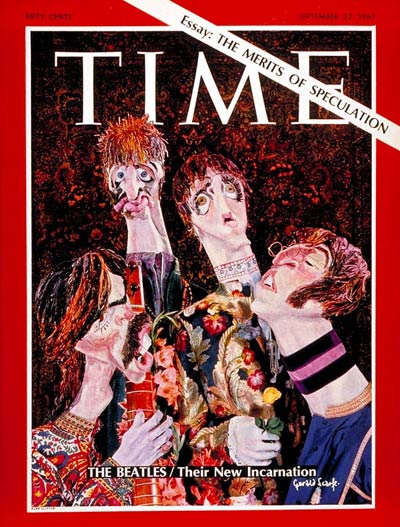
Milestone moments do not a year make. Often, it’s the smaller news stories that add up, gradually, to big history. With that in mind, in 2017 TIME History will revisit the entire year of 1967, week by week, as it was reported in the pages of TIME. Catch up on last week’s installment here.
The release and success of the album Sgt. Pepper’s Lonely Hearts Club Band was only one of the reasons why The Beatles found themselves on the cover of TIME this week. More importantly, the story was a recognition of the fact that the band had rather smoothly moved on from the teenybopper sound that had made them famous to “a higher artistic plateau.”
Without losing the sense of fun that had so captivated audiences, The Beatles had stretched their musical limits and, in doing so, managed to speak to both eternal struggles of love and life and the very of-the-moment revolution that was the 1960s. Though they had shed a few of their fans (like younger listeners who flocked to groups like The Monkees for their dose of pop harmony) they had sustained the interest of their maturing original listeners while capturing new fans, too. It was a feat that was almost impossible not to notice, the story observed:
Rich and secure enough to go on repeating themselves —or to do nothing at all—they have exercised a compulsion for growth, change and experimentation. Messengers from beyond rock ‘n’ roll, they are creating the most original, expressive and musically interesting sounds being heard in pop music. They are leading an evolution in which the best of current post-rock sounds are becoming something that pop music has never been before: an art form. “Serious musicians” are listening to them and marking their work as a historic departure in the progress of music—any music.
For some of those “serious” fans, TIME’s writers believed, the new thinking about The Beatles had crossed the line into “over-interpretation.” But for most, it was simply refreshing to be able to hear their take on what one fan called “the world, love, drugs, the way things are.”
And, moreover, “when The Beatles talk—about drugs, the war in Viet Nam, religion—millions listen, and this is a new situation in the pop music world.”
In hindsight, though the observations about the band’s impact would certainly stand the test of time, there’s a certain sadness that clings to the lighthearted take on the interpersonal dynamics that created that revolutionary sound. “The Beatles keep in touch constantly, bounding in and out of each other’s homes like members of a single large family—which, in a sense, they are. Their friendship is an extraordinarily intimate and empathetic bond,” the story noted. Their background, experiences, talents and careers had joined them in a way that could not be replicated and, as they eagerly planned for their upcoming trip to study with the Maharishi in India, there seemed to be no limit to where the group could go.
The Beatles would announce their break-up about three years later.
Labor pains: With 1967 more than halfway over, the year was already being proclaimed “the biggest year of labor strife in more than a decade.” Strikes were sweeping through a number of industries; even the Rockettes, for the first time in 35 years, refused to kick again until their pay was raised. The reasons for the trend included general economic good fortune — low unemployment meant workers felt free to make demands — but also a growing awareness, courtesy of the civi rights movement, that sometimes the way to get what you want was to demand it.
Rock the boat: A referendum over sovereignty in Gibraltar had come back with a solid result, with only 44 of more than 12,000 voters expressing the desire for the British territory — the last colony in continental Europe — to become part of Spain. Spain, however, refused to admit the legitimacy of the vote, on the idea that the people who called themselves Gilbraltarians were essentially interlopers. The issue has returned to the news recently, as Brexit may place new demands on residents for sticking with the Brits.
Life in space: Though the experiment wasn’t exactly the focus of the Space Race, it still had scientists excited when a space mission called Biosatellite 2 returned information about the effects of weightlessness of beetles, wasps, frog eggs, pepper plants, gnats, mold, bacteria and more.
DUI: With traffic fatalities shockingly high, and alcohol implicated in more than half of those accidents, the National Safety Council was reassessing what should count as too drunk to drive. Their new recommendation for states placed blood alcohol limit at 1%, but many advocates believed it should be even lower. In Norway, for example, drunk driving was much less of a problem, fatality-wise, and their limit was 0.05%. (Today, the limit in the U.S. is, for now, 0.08%)
Great vintage ad: Here, the United Nations entices tourists to come visit its headquarters.
Coming up next week: Interracial marriage
More Must-Reads From TIME
- The 100 Most Influential People of 2024
- Coco Gauff Is Playing for Herself Now
- Scenes From Pro-Palestinian Encampments Across U.S. Universities
- 6 Compliments That Land Every Time
- If You're Dating Right Now , You're Brave: Column
- The AI That Could Heal a Divided Internet
- Fallout Is a Brilliant Model for the Future of Video Game Adaptations
- Want Weekly Recs on What to Watch, Read, and More? Sign Up for Worth Your Time
Write to Lily Rothman at lily.rothman@time.com